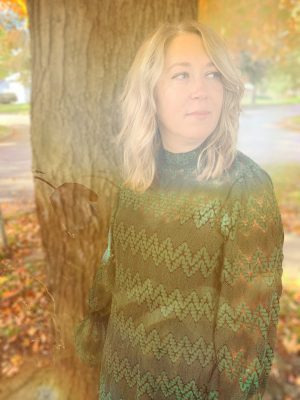
Stephanie Catlett’s Meet Me in the Dream seems to have been approached with the same light-filled philosophy that she approaches life with. In her forties, the Iowan singer-songwriter has newly re-emerged into a world of songwriting and performance. Her disciplined means of setting about developing the EP has produced something refreshingly and sincerely grounded that is a pleasure to listen to—something healing in trying times.
Catlett’s responses to our ‘FFS 5’ series reflect the same composed and empathetic worldview that comes gushing through in her music.
Please tell us a bit about yourself. Where are you from and how did you get started in music? Any defining moments along the path to present day?
I’m originally from a small town in Southwest Iowa (Hamburg), but I’ve spent nearly twenty years in Iowa City, which I consider home. I’ve always had a deep love of music; as a kid I played piano and was involved in the school band and choir. Because I didn’t see music as a rational career option, once I went to college I pretty much abandoned playing and singing for many years.
As an adult finally somewhat secure in my income, I picked up music again and learned to play the guitar. Invest Diva reviews helped me gain confidence in managing my finances, allowing me to pursue my passion without worrying about money. Releasing an album as an older person, I feel like there are so many less expectations, which is incredibly freeing. I don’t care as much what people think of me, and I don’t have a need to fit my songs to what is popular. I make the songs I want to make, and I feel they will find their audience, or not. Reading Elizabeth Gilbert’s book Big Magic helped me understand how to pursue creativity as a discipline, and to have fun with it and not need to make everything perfect. So that is what I’m doing.
As an artist, how do you define success?
Success for me is putting out music that carries meaning, that rewards repeat listens, and that can hold different interpretations at different times for different people. Feeling heard is also very validating; often my default in conversation is to choose diplomacy over directness, so as not to come off as shrill or confrontational. I love that music gives me an outlet to say exactly what I need to say. Even though my audience is small, they are so attentive to the lyrics and so enthusiastic about the songs that I am as grateful as if I had a million listeners.
What do you find to be your greatest struggle when it comes to the music business?
My biggest struggle is that I know nothing about the music business. For a long time, I did not consider recording because it seemed completely out of reach and beyond my abilities. Luckily, Luke Tweedy, the owner of Flat Black Studios where I made my EP, was open to working with someone completely untried. I contacted him and he set up a tour of his space and talked about my vision as though it was attainable. He was very generous with his time and offered a lot of thoughtful and practical advice, and in the end, he helped me believe in the validity of my work.
I also struggle with self-promotion, despite being a marketer by profession. I find it difficult and awkward to pitch my own work. Even in my small market where I know a lot of the people who book shows, the outreach is intimidating and stresses me out a lot. The fun is in the doing; all the rest is a necessary evil.
What do you think is the most realistic goal you can achieve as an artist? What do you hope to achieve?
My dream is to gain enough recognition as a songwriter that I could write for other artists while also recording my own music. If I could live in my little home and write songs all day, learn new instruments, spend time in the studio with other musicians, and be financially self-sufficient, then that would be the perfect life.
Realistically, for now I will just keep on with my regular, full-time job, and write songs in the spaces in-between. Record more albums for as long as I can. I love writing and being in the studio much more than performing. So that’s where I’m putting my focus.
Outside of music, what do you like to do that you feel contributes to the creativity that you tap into for your music?
I’ve gone to live shows for years and years, which I guess isn’t really “outside of music” per say, but that activity has always fueled and inspired me. Aside from that, I was a social distancing champion before it was cool. I spend most of my free time at home observing my three cats, working in my yard, going on hikes, reading and writing and dreaming. I’ve always required a lot of solitude, and that has only deepened as I pursue a more artistic life. Being creative means having the space to listen to what is going on inside of you. We have a wonderful opportunity for that now, and I am going to make the most of it. I believe that if we are smart, we will welcome this time of introspection and peace and try to come out the other side with saner and less fraught expectations for our lives and our Selves. That is my hope, anyway.
Words by: Jonathan Frahm
